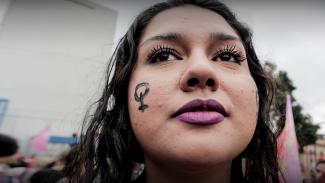We feature here key reports and resources related to the 32nd session of the Human Rights Council held in Geneva from 13 June to 1 July 2016.
Round-up pieces
- From ISHR: Wrap up of the 32nd Session of the UN Human Rights Council
- From SRI: Sexual Rights at HRC 32
Key Reports
- Health and Safety: Working Group on Discrimination against Women in Law and in Practice
- Special Rapporteur on Violence against Women, its Causes and Consequences (PDF)
- Fundamentalisms: Special Rapporteur on Freedom of Assembly and Association (report)
- Rights of Adolescents: Special Rapporteur on the Right to Physical and Mental Health
Key Resolutions
- Preventing and responding to VAW against indigenous women
- Discrimination against women: health and safety
- Racism and women
- Discrimination against women and children in nationality laws
- Human rights, sexual orientation and gender identity
- Civil society space
- Freedom of peaceful assembly and association
- Protection of the Family
Civil Society Statements
- Statement by Action Canada for Population and Development (PDF)
- Call for support and solidarity in rejecting amendments to HRC32 draft resolution protecting civil society space
- SRI calls for political and legal framing that recognizes full range of sexual rights (PDF)
- Call for SOGI Independent Expert (PDF)
- Statement on sexuality, rights, gender and bodily autonomy (PDF)
- APC statement in support of the report of the Special Rapporteur on freedom of expression and opinion (PDF)
- Coalition of African Lesbians says No to a Special Rapporteur on SOGI
- GATE statement on the UN SOGI mandate (PDF)
External Links (general information)
- Practical Guide to the Human Rights Council (OHCHR) (PDF)
- Practical Guide: Civil Society Space and the United Nations Human Rights System (OHCHR) (PDF)
- About the Human Rights Council (Sexual Rights Initiative)
- Guide for Civil Society: How to Follow Up on UN Recommendations (OHCHR) (PDF)
Tweets
Why has Russia filed so many hostile amendments at #HRC32 in relation to women's rights, discrimination & protection of civil society space?
— ISHR (@ISHRglobal) June 29, 2016
Over 240 NGOs call on #HRC32 to stand with civil society and against repression and regressive Russian amendments https://t.co/eOXcktpzds
— ISHR (@ISHRglobal) June 29, 2016
We call on the #UN #HRC32 to adopt a strong resolution to protect our human rights online https://t.co/k554799qCH pic.twitter.com/Eq0Ak9JcSu
— ARTICLE 19 UN (@article19UN) June 27, 2016
This is what #Russia thinks of #ProtectCivilSocietySpace at #HRC32. Amendment (L.63) attacks the heart of resolution pic.twitter.com/OhbRMeah5w
— ARTICLE 19 UN (@article19UN) June 29, 2016
About the HRC
The Human Rights Council is the foremost international body for the promotion and protection of human rights and can be used to bring pressure on governments to take steps to implement and develop human rights norms, including rights related to gender and sexuality.
It meets in three sessions per year in Geneva (spring, summer, fall)
The Office of the UN High Commissioner for Human Rights (OHCHR) is the secretariat for the HRC.
The HRC works by:
- Debating and passing resolutions on global human rights issues and human rights situations in particular countries
- Examining complaints from victims of human rights violations or activist organizations on behalf of victims of human rights violations
- Appointing independent experts (known as “Special Procedures”) to review human rights violations in specific countries and examine and further global human rights issues
- Engaging in discussions with experts and governments on human rights issues
- Assessing the human rights records of all UN Member States every four and a half years through the Universal Periodic Review

